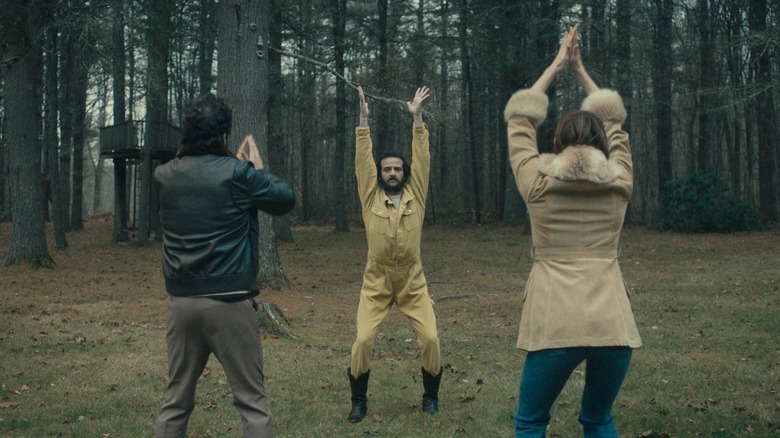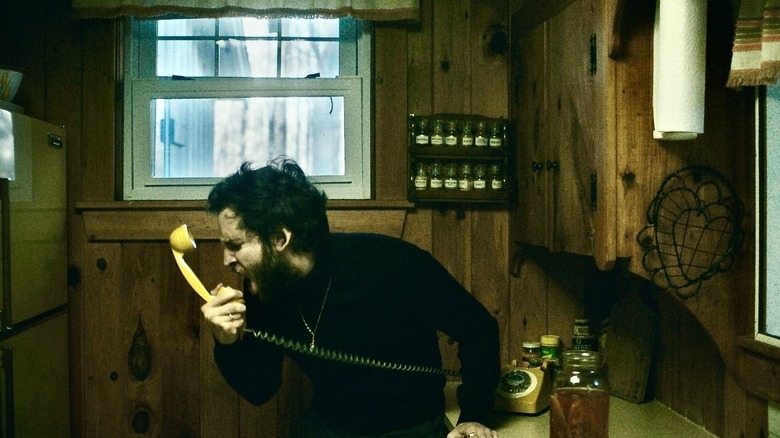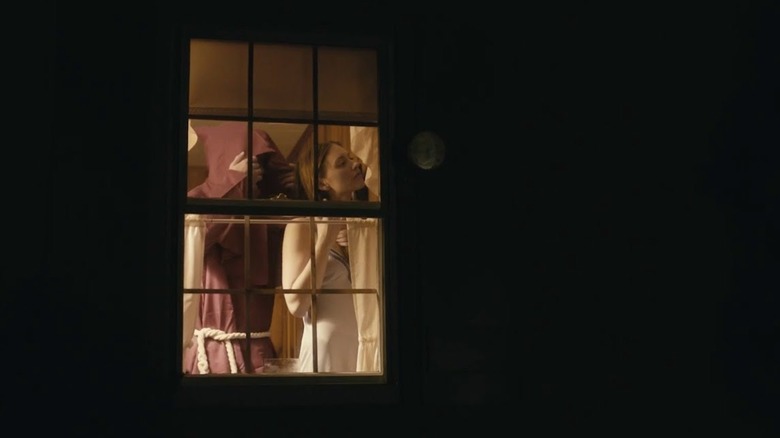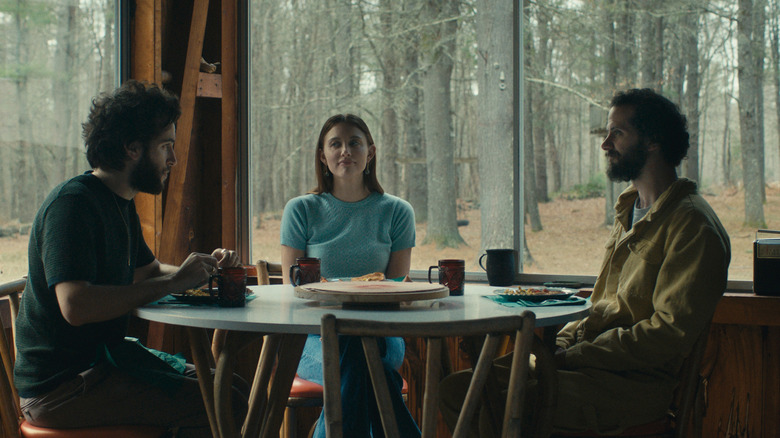To The Moon Director Scott Friend On How To Make A Horror Movie In The Woods [Interview]
Scott Friend hadn't directed before "To the Moon." No shorts, no commercials, or music videos. Friend had been acting for over a decade, though, and even produced a few short films. Right before the pandemic, he decided it was time to make a movie. "All my favorite filmmakers and interviews and whatnot, when they're asked, what advice would you give young filmmakers? Just go make a movie," he said. "Yeah, just go do it."
Friend's movie is already now one of those success stories of a director going out to the woods with a camera, a small crew, and a limited cast. He shot the grounded psychedelic horror film, which is about addiction and family, at his aunt's house with no expectations. Ultimately, "To the Moon" scored fans at festivals, landed a distributor, and has now hit Shudder.
Recently, Friend told us about his journey with his debut film and advice he'd give to any aspiring filmmakers who want to journey out into the woods and make a horror movie.
'Therapy is expensive and horror is free'
You have a small location but big themes. You tell a story of addiction, career, marital issues, family issues.
It was a total amalgamation of everything that was going on in my life at the time that I just smashed together. And then, yeah, that's exactly what it is.
How'd you decide to make that personal story a horror movie?
I didn't want to make a really bleak family drama only because genre films are just so much more fun to explore dark themes. I like watching genre films that touch upon dark subjects. I feel like there's a different way that they go about them than just a straight-up drama. And also because so much of it is based on my personal experiences and relationships, it's like, I'm living it. I've lived this. So I don't want to watch the exact thing. I want to spice it up a little bit.
I imagine dealing with those experiences in horror, too, was maybe a little more satisfying or helpful.
Yeah, totally. I think it might have been Mick Garris [who] said, "Therapy is expensive and horror is free," or something along those lines. I totally agree with the sentiment of what he's saying. I mean, there's a reason why you're seeing so many horror films and genre films, now especially, and throughout time, touching upon really dark human subjects.
Once you've finished writing and tell financiers, "It's a horror movie set in the woods," is it easy to get that financing?
This was a super small production. So a lot of the financing came through various ways of some financiers and a lot of my own personal savings and friends and family helping out. We shot it at my great aunt and uncle's country house, so that was free. So it's a super small production, but I think horror films and genre films are definitely more enticing for a first-time filmmaker to financiers.
Was the dog also yours? That just goes a long way in making you worry.
Yeah. That is my dog. He's on the couch right next to me right now. I think in so many horror films recently, when you see a dog or a cat in the opening of the film or in the beginning of the film, you're like, "Oh, that animal's dead." And I was like, "I am not doing that in my movie." I hate that. I just love animals.
What advice would you give to a filmmaker who wants to go out into the woods and make a horror movie?
It's tough. I would say, just have as much fun as possible and just be really open to everything that can happen. So many instances of when we were shooting this movie, things would just happen that weren't planned and ended up being exactly what we needed for certain scenes. Just be open to every possibility.
Such as?
First off, it was freezing out. I think that added a lot to the performances. It felt very real in that sense. Everyone was pretty uncomfortable, which I think was a good thing because it's an uncomfortable movie. And there's an underlying theme of that kind of uncomfortability and chaos happening.
When we were shooting out in the woods, a lot of things would happen, getting hit in the head with tree branches, that ended up in the film. When you're in a controlled environment, that's what it is, it's controlled. And when you're outside in the woods, anything can happen. So yeah, just lucked out in a lot of ways.
What did you feel great control over in this environment?
It's funny you say that because the first two days that we were filming, it was just my Dennis and Mia scenes and we thought we had everything under control. We shot 11 pages in one day, which is insane. We ended up having to reshoot everything because it was totally out of control. I think we felt we were so in control, but yeah, anything that we're shooting interior wise, we have the most control over.
What was out of control?
I think we were so excited in the beginning. I think it was just an excitement. We shot the first two scenes and only did two takes per setup. I was like, "All right, let's just keep going. Let's see how much we could do in one day." And then we watched the footage at the end of the day and it was not good.
'Aways to keep everything as grounded as possible'
Did you use all natural light?
A lot of natural light. My cinematographer and gaffer are super, super talented. We definitely use as many practical lights, as well. Daytime it's like all natural light and then nighttime it's mostly practicals.
What'd you shoot on?
The Alexa. It was great. Again, my cinematographer just really did such a great job. We shot on the Alexa with Cooke S4 lenses to give it that vintage feel. Yeah, we had a great experience. We didn't really run into any issues in the camera department.
For the more psychedelic sequences, how much did you want to do in camera versus post?
I think the intention was to do as much in the camera as possible just to keep everything as grounded as possible. Of course, there are some VFX shots that we utilized in post, but for pretty much everything in the film, we tried to keep everything in camera as possible. I mean, the most simple practical effect was just the block contacts for Mia's character, and I thought it looked great on camera. It was very simple. My perspective on making this movie was always to keep everything as grounded as possible, so it reads as real as possible to an audience.
So you never wanted to go for a lot of blood and guts?
I think because the tone of the piece is so much rooted in this family's relationship with each other, I just didn't want to go down the route of a super gory type of film. I feel like the creeping sense of dread when you have a loved one who is an addict and thinking if they could relapse or worse, I think that's the heartbeat. That's hammering them over the head instead of someone coming around and slashing everyone's throats, it's more of a metaphorical slashing of the throat.
What effect have you noticed a lot of these choices having on an audience?
It's interesting now to see what the audience takes from it and walking the line of just putting faith in the audience. I feel like at this point in time, everyone has a friend or a loved one who has gone through addiction or still is. And those themes will resonate with them and they'll be able to identify certain characteristics of all the characters.
We've gotten the whole spectrum of reactions at this point and there's a lot of people that are dealing with a loved one who is in the throes of addiction right now. Just having conversations like that, conversations about who to trust in your life. That comes up a lot. Even if you need to cut someone out of your life or not. Those types of conversations, those fun conversations.
Has anyone said they relate to the brother?
[Laughs] I don't think so. But I have had a lot of people tell me that until the end of the film, they fully thought he's a very earnest guy. He's just a little off and he is trying to redeem himself and become a new person. And that's kind of cool because we had to really walk the line with how we're going to portray Roger to the audience. We definitely didn't want to dip too deep into the sinister pool.
Do you have conversations with him about his performance of, okay, this is how we can make an audience uncomfortable in this setting?
We definitely had a lot of conversations about what each character means. I really wanted each character to represent in a way an element of addiction, whether it's Mia's character is an enabler in a lot of ways, but she's also very close to who I am, who I am in real life. And Roger is so emblematic of drugs. He's the physical personification of drugs and chaos.
So, we didn't really talk about how at that point, because we didn't know what this movie was going to end up being. We definitely didn't talk about what the audience would think of them, but we had a lot of conversations about the characters and what they represent and how we want to portray it while we're shooting it.
'I would say have no expectations'
How else did you want to create an atmosphere of dread?
Well, visually it was really important to give this film a sense of timelessness in a way. It's heavily influenced by films of the late sixties and early seventies. I think part of creating that sense of dread is to give it that gloomy muted colors, like a crunchy grainy feel to it that certain thrillers from the seventies had. Whereas some films in modern days now feel a little too crisp and polished. So, that was definitely important to evoke that feeling visually.
What about finding the right pace for an effective slow burn? When can a shot go from unsettling to slow?
That was just working with my editor for many, many, many hours. It's a gut feeling, I think. Of course, it's not going to appeal to everyone because everyone is so different, but it's just what makes me uncomfortable and what makes me like, all right, this is enough. This has gone too far. Now it feels kind of cheesy or whatnot.
How about for sound? Especially for post-production, how can you turn up the dread?
One of the coolest things about the process in post-production is the sound design. And this is my first feature and I've never directed a short before. I had no experience working with a sound designer. You really build another world in the sound design that elevates the picture so much, because you can do anything you want. We added a lot of these fisher cats, which are these really weird breeds of, I don't know, a cross between a mountain lion and a regular house cat, maybe. I don't know, but they're real, these vicious little things. They scream in the woods, and they're so scary. We added a lot of those in the exterior shots.
Something that was really cool to play with was with the sound design was when Dennis is tripping or dreaming, we manipulate the sound. The outside sounds, the crickets, the birds, the insects; we manipulated those to emphasize what's going on in his mental state.
Very ambitious to jump into a first feature without making any shorts first. How'd you make that choice?
You know, a big catalyst in making this movie was my great aunt told me, she thought she was going to have to get rid of this house. It's been in our family for as long as I've been alive, and I've always wanted to make a movie there.
When she told me that it gave me the spark to write this movie. So, this could be my last chance to make this film. I wrote this script quickly, put it together really quickly, and then we shot it. Since this was my last chance to make something here, I wanted it to be a feature. I just didn't want to make a short. I don't know if that was a smart decision or the wrong decision. It's just a decision that I made and I went for it. Now, we're here.
I'd say it worked out. How did the expectations of making your first movie compare to reality? What were some lessons?
It exceeded literally all of our expectations because it's such a small movie. I thought, let's just make this as cool as possible and we'll figure out how to get it out. We shot just before the pandemic hit. And then we did all of post throughout the pandemic and as we know, the pandemic changed everyone's lives and it made getting smaller films seen harder and definitely with the festival circuit.
We got really lucky when we played at some cool festivals and got to do some travel as well and bring it around the world. So as far as expectations, I would say have no expectations. That's the best advice. Have hope but no expectations. And just have the most fun you can possibly have. Give it your all, because the only thing that's in your control is to try to make the best thing possible. That's the only thing you can control.
"To the Moon" is now available to stream on Shudder.



